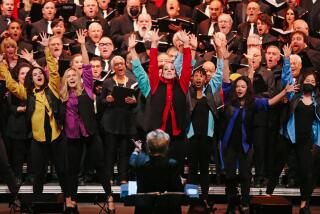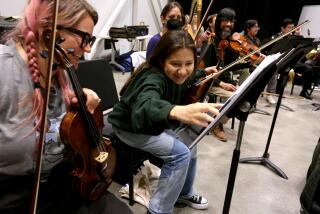MUSIC REVIEW : A Cappella Ensemble’s Mastery Spans Centuries at Irvine Concert
- Share via
IRVINE — It started 16 years ago as a group of friends meeting weekly to sing music of the Middle Ages and the Renaissance, periods during which women were not permitted to sing in church. Saturday night at the Irvine Barclay Theatre, the male a cappella vocal ensemble Chanticleer demonstrated its mastery of works from the 16th Century as well as a variety of 20th-Century styles and genres.
Technical excellence conquered every test of this eclectic program: Each phrase began and ended with minute synchrony, intonation never wavered, a characteristically mellifluent tone quality withstood changes of vocal range and dynamic level, and texts received careful enunciation.
The disciplined 12-member group, led by music director Joseph Jennings, negotiated the polyphony of Cristobal de Morales with seamless clarity. Divided into three choirs, the men traversed the gamut of Andrea Gabrieli’s Magnificat precisely and with apparent ease.
Richard Strauss’ “Drei Mannerchore” benefited from an ever-refined balance and touching attention to the lush harmony changes and to text-meaning. Steven Sametz’s modest “I Have Had Singing” captivated through simplicity, while a composition that was commissioned for Chanticleer--”Charm Me Asleep,” by David Conte--proved more memorable for its quiet, sustained performance than for its conservative choral writing.
The ensemble also offered a group of folk songs, popular songs and spirituals. Countertenor Christopher Fritzsche’s soprano rang clear for a solo in the British folk song “O Waly Waly” and Eric Alatorre’s bass lent memorable richness to Jennings’ lively adaptation of “Wade in the Water.”
More to Read
The biggest entertainment stories
Get our big stories about Hollywood, film, television, music, arts, culture and more right in your inbox as soon as they publish.
You may occasionally receive promotional content from the Los Angeles Times.










